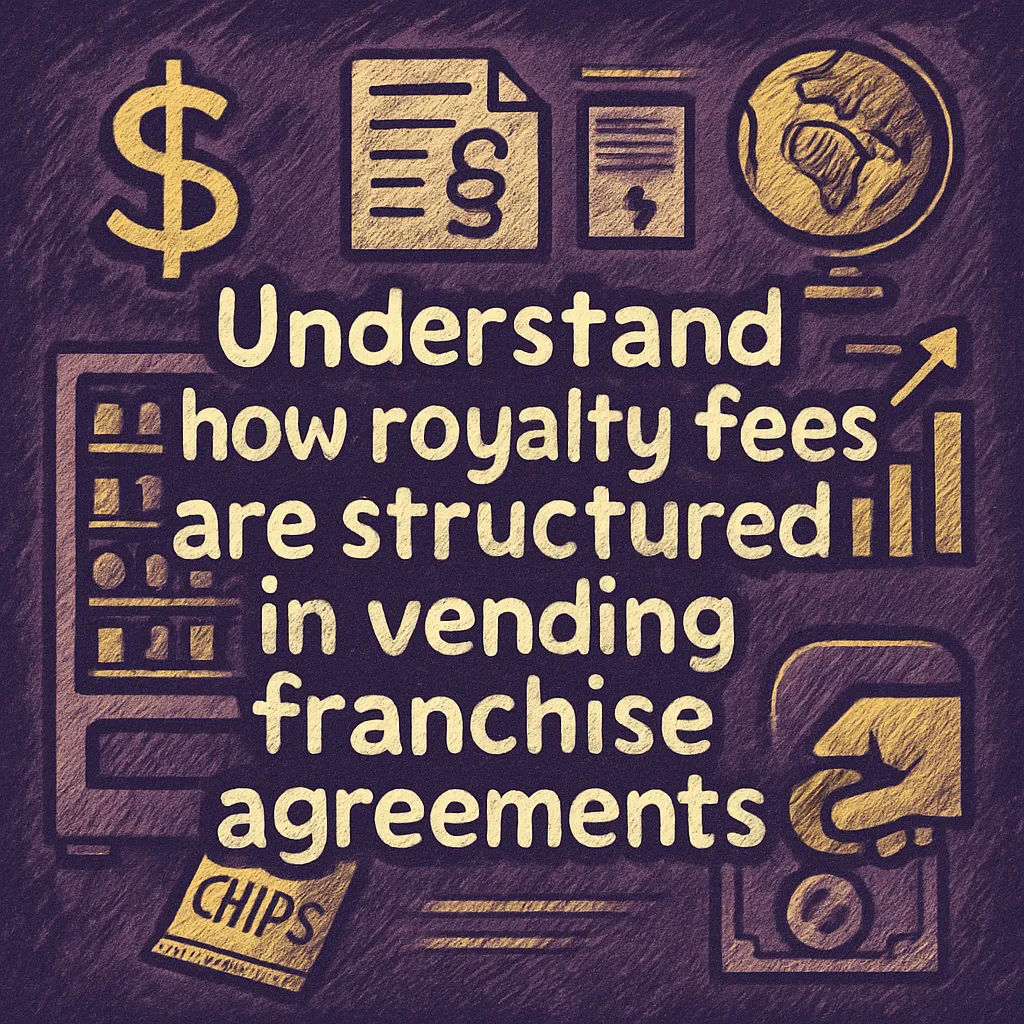Vending Franchise Royalty Fees Explained
Understand how royalty fees are structured in vending franchise agreements.
Back to Vending Franchises ResourcesUnderstand how royalty fees are structured in vending franchise agreements.
Back to Vending Franchises ResourcesStart your 30-day free trial and get instant SMS and email alerts whenever a local business needs vending service. These are real location leads to help you grow your route — you decide which ones to buy, no obligations or contracts.
![]() Ongoing payments for brand use and support
Ongoing payments for brand use and support
![]() Typically calculated as a percentage of gross sales
Typically calculated as a percentage of gross sales
![]() Essential for receiving franchisor support and systems
Essential for receiving franchisor support and systems
30 days free, then $39 / month.
No Commitment. Cancel Anytime.

Vending franchise royalty fees are a cornerstone of the franchising model, representing the ongoing financial exchange between a franchisee and franchisor. These fees compensate the franchisor for providing access to its established brand, proven business model, operational support, and continued innovation. For aspiring vending business owners contemplating a franchise, understanding how these fees are structured and what they entail is paramount to evaluating the investment and potential profitability.
Most commonly, royalty fees are calculated as a percentage of the franchisee's gross sales. This percentage can vary significantly across different vending franchises, typically ranging from 4% to 10%. Some agreements might involve a fixed monthly fee, especially in certain niche vending markets, but percentage-based royalties are prevalent as they align the franchisor's success with the franchisee's revenue. It's important to note that these fees are usually based on gross revenue, not net profit, meaning they are paid before operating expenses are deducted. This structure ensures a consistent revenue stream for the franchisor.
These royalty payments enable franchisors to invest in critical areas that benefit the entire franchise network. This includes ongoing research and development for new products, technology upgrades for vending machines, marketing campaigns that boost brand recognition, and continued training and support programmes for franchisees. Understanding these elements can help an operator evaluate the worth of these fees by seeing into the comprehensive support system and infrastructure that these fees help maintain. For more detailed insights into the general financial aspects of launching a venture, exploring the cost to start a vending business can provide valuable context.
Prospective franchisees must distinguish royalty fees from other financial obligations. Initial franchise fees cover the right to use the brand and receive initial training and setup assistance. Royalty fees, however, are continuous payments. Additionally, many franchises require separate contributions to an advertising or marketing fund, which are distinct from royalty fees and used for system-wide promotional efforts. This distinction is crucial for accurate financial planning and understanding the true cost of operating a vending franchise. Before committing, it can be beneficial to read up on questions to ask before signing a vending contract to ensure all financial obligations are clear.
Vending Exchange connects vending operators with real businesses actively looking for vending services—including traditional machines, AI coolers, and office coffee. Get instant SMS and email alerts when new opportunities are available in your area. No contracts or monthly fees—just buy the leads you want. Start your free 30-day trial today and grow your vending business on your terms.
Royalty fees are ongoing payments made by a franchisee to the franchisor for the continued use of the brand, systems, and support.
They are most commonly calculated as a percentage of gross sales, but some may be a fixed monthly or annual fee.
Percentages can vary widely, often ranging from 4% to 10% of gross revenue, depending on the franchisor and industry.
No, marketing and advertising contributions are usually separate fees, often referred to as an 'ad fund' or 'marketing fee'.
Generally, royalty fees are non-negotiable as they are standard across all franchisees to maintain consistency.
Failure to pay royalty fees can lead to a breach of the franchise agreement, potentially resulting in termination of the franchise.
Some franchisors offer reduced or deferred royalty fees for a short initial period to help new franchisees get established.
Benefits include brand usage, ongoing training, operational support, access to proprietary systems, and collective marketing efforts.
Royalty fees are almost always calculated based on gross sales, before expenses, to ensure a consistent revenue stream for the franchisor.
Payments are typically made on a weekly or monthly basis, as specified in the franchise agreement.